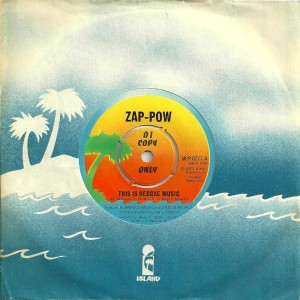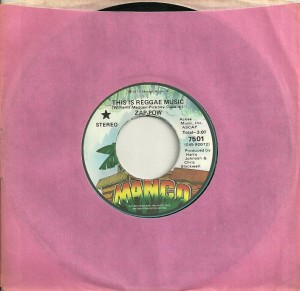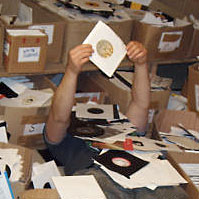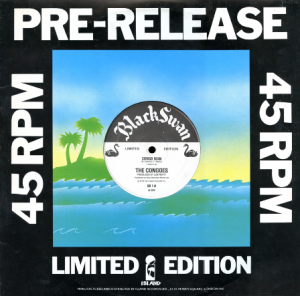
Listen: Congo Man / The Congos CongosCongoMan.mp3
As with anyone, once you get into a phase, like my recent reggae one, you probably end up trolling through loads of related records. In the case of reggae/ska here at home, they’re all separated into their own shelfs, both singles and albums, unlike any other genre. Reason: Corinne was such a reggae nut, I preferred to keep them separated so as not to have her pawing through all my other records, misfiling and doing harmlessly exactly as every other person would, being a bit sloppy about how they should be housed. Me: I’m immaculately ridiculous. I admit it.
When I stumbled on The Congos (yes it is misspelled on the label) the other day, I had suddenly remembered how extreme, maybe the most extreme ‘Lee Perry at his druggy-ist production ever’ this one and only Black Swan UK single was. And also what apparent controversy surrounded it (coming later).
All that aside, I cranked it, through the big Tannoy speakers. Truth be told, I’m no audiophile, and happily spin singles on either one of the two portable suitcase players I own. Occasionally, I’ll fire up the two turntable, DJ mix set up with all the speakers, either for an evening of playing records with a shortlist of close friends or for reggae. The bass is still amazing on those massive, and probably by today’s current high brow standards, archaic Tannoys.
So out comes ‘Congo Man’, on goes the big system and loud goes the volume. (The house was empty otherwise I’d have not even made it to :20). Wallop. I had forgotten this record’s power. And at 45 rpm, as with all singles, there’s even that much more bite.
Well, this is easy, I’ve just found my next post.
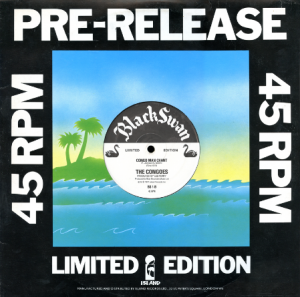
Listen: Congo Man Chant / The Congos CongosCongoChant.mp3
Having no recollection of the dub B side, then verifying it was never included on ARKOLOGY, the basically excellent Lee Perry anthology Island did back in the late 90′s, this flashback was no let down. This dub version could either convert or scare anyone.
I had thought Island’s rejection of The Congos album, only the above single was pressed as a promo only, never given a catalog number (which would be four digits and prefixed with WIP) was the reason Lee Perry burned down his infamous Black Arc studio. So I went to the expert, Duane Sherwood, for confirmation. It was not. His reply is below:
“Congo Man’ was the only single Island deemed suitable for release from the rejected HEART OF THE CONGOS album.
As far as I know, it’s the only serious blunder Chris Blackwell made in his stellar career (although some claim this was more about a business dispute than the music), sheparding Jamaican music thru Island and its sub-labels. The Lee Perry produced album is now in the Top 5, if not #1, on many of the most knowledgeable reggae musicoloigists all time lists. In Jamaica, the single was preceded by ‘Row Fisherman’, which came out a while before the album. Also, in Jamaica, at least three other singles were released from the album, two of them as extended, speaker burning, Black Art 12″s.
The trio, Cedric Myton, Ashanti Roy Johnson and Watty Burnett, introduced Perry to the beginnings of his rasta faith. They got him taking better care of his health, and that’s when the pictures of him with tiny dreads spiking up in his hair began to show up. Backing The Congos were the classic house rhythm section The Upsetters: Mikey Boo Richards on drums, Boris Gardiner on bass, Winston Wright on organ and Ernest Ranglin on guitar. The trio reunited and went on tour when the UK Blood & Fire label reissued HEART OF THE CONGOS in the 90′s, and played the entire album in front of enthralled old timers who never thought they’d see it.
‘Congo Man’ is a relic from the golden era of Perry’s Black Ark studio. Perched behind his house in Washington Gardens, the cinderblock and wood structure had become the coolest place in Jamaica in the mid-70′s, basically making it the coolest place anywhere in the universe at that time. Various up and coming singers hung around, hoping to be the closest one when Scratch suddenly got an idea and was looking for someone to sing it. The established stars of Perry’s stable, such as Junior Murvin, Jah Lion, Augustus Pablo and The Heptones were always about, adding harmonies and parts.
But there were also a growing population of ‘blood-suckahs, pimps and ‘ooligans’ frequenting the studio. Heavy hitter rastas came calling, looking to induct Perry deeper into their organization, which he resisted. He got fleeced by a promoter, who he invested with for a broadway musical about reggae and rasta. A lot of women were about too, and Lee Perry was a mover, despite his wife and family being around. Some of the more orthodox stars like Gregory Isaacs stopped coming, on account of “too much farn-i-cay-teen” on the premises.
The whole vibe, combined with the copious amounts of ganga being passed around and the rum being sipped, was a recipe for trouble. As Island started rejecting many of the full length releases Scratch was continually submitting, frustration started to build. Perry used to hold up an actual Island record with the island of Jamaica at sunset in the background on black vinyl. “See? Chris Blackwell surround the island” he used to say.
At some point, his wife Isha began an affair with Danny Clarke from The Meditations and that set the collapse in motion. Scratch decided he was done with all the hangers on and rasta theologians. He started acting crazy, put a sign on his front gate saying “I’m a Batty Boy” (JA slang for faggot). He started putting a huge piece of pork on the antenna of his car to keep the rastas away when he went out. It was always surrounded by flies in the hot Jamaican sun. He had been writing all over the walls of the studio for a while now, but he began drawing ‘X’s over the writing and everywhere, even burning them into the large leaves of the garden with a magnifying glass. Around this time, as the news started coming in about Bob Marley’s worsening condition, Scratch began walking around town backwards, stopping every so often to strike the ground with a hammer.
It’s generally believed that this is when he burned the studio down, but in actuality that happened several years later. He had left to America, made records backed by American reggae-rock bands like The Majestics, and returned. There are a few versions of the fire story, my favorite being the German tourist that showed up and wouldn’t leave. Perry got so frustrated, he grabbed one of the glass bottles of petrol in the driveway and threw it on the roof, then set it ablaze to scare the tourist off, which it did. Perry turned on the garden hose to put the fire out, but the local water had been turned off for the night. Scratch is said to have immediately sent his son out to buy a bottle of rum, saying “If Black Ark a g’waan burn, we haffa keep a party!”
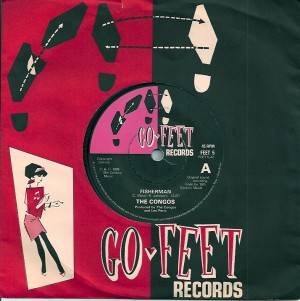
Listen: Fisherman / The Congos CongosFisherman.mp3
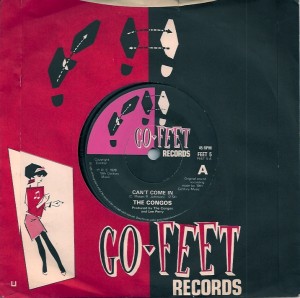
Listen: Can’t Come In / The Congos CongosCantComeIn.mp3
In 1980, The Beat’s ska based, and generically visual leaning label, reissued the album, pulling two more tracks from HEART OF THE CONGOS as a single. They are above.
